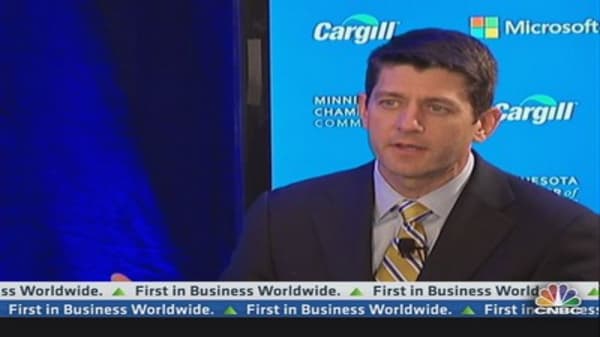"Amnesty is wiping the slate clean and forgetting any penalty that was once there," he said. "Nobody is suggesting that takes place."
While a bipartisan group of House negotiators has not yet unveiled compromise legislation, Ryan said they won't be far behind the Senate.
"I don't know if we can make the Fourth of July deadline, but we'll be close to it," he said. "We'll be bringing legislation to the floor. I do think we'll go to conference [with the Senate] with immigration reform."
Ryan shrugged off opposition on the right as less potent than in the past, saying the economic and national security arguments for overhauling the system have grown stronger. He has long battled Republicans on the other side of the issue, including when he joined his mentor Jack Kemp in denouncing a 1994 California ballot initiative that barred noncitizens from receiving state social services.
"We've had this debate in the conservative movement for a long time," Ryan said. "It's better from the pro-immigration standpoint than it's been before."
(Read More: Immigration Bill 'Could Create DMZ' Like Korea)
At the same time, he rejected the charge from a variety of quarters—including former President George W. Bush—that the stronger GOP push on the issue now stems simply from a political calculation about the need to court Hispanic voters for future elections.
"It really isn't," Ryan said. "If our motivation is that if we come around to this then it's going to help us win election, then we shouldn't bother trying. My motivation, and the motivation of the mass of the Republican Party, is that we believe in the rule of law, we believe in the need to have better security on our border, and we believe in economic growth."
He conceded the impossibility of the budgetary "grand bargain" he favors, which would alter the nature of Medicare by shifting toward a fixed government benefit that recipients would use to buy private insurance. But he said a smaller deal remains possible, despite Republican opposition to the additional tax increases Democrats have insisted on.
"Getting a down payment on the problem, with singles and doubles as I describe them, is hopefully in the realm of possibilities," Ryan said. He has been conducting quiet talks with Senate Budget Chairwoman Patty Murray in hopes of identifying a compromise by year-end.
(Read More: Rubio: Majority of GOP Support Immigration Reform)
"There are a lot of entitlement reforms that I think both sides ought to be able to agree to, which don't offend either party's ideology that gets us down a good path," he said. "That's what I want to see in a final budget agreement. That's what I'm moving toward, and I'm guessing it won't take place until fall."
Ryan repeated familiar Republican arguments about tax reform: that closing loopholes while lowering rates would generate additional revenue through economic growth. But he didn't rule out accepting some amount of "static revenue" increase—a tax hike not dependent on assumptions about growth—if coupled with a thorough-going overhaul that significantly reduces the current top rate of 39.6 percent.
"Show me a tax code that gives you the top rate in the 20s, with a broad base that's pro-growth, and I'd be happy to look at it," he said. "I'm not going to negotiate in the media. I have yet to see a plan that does that."





